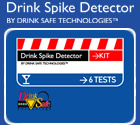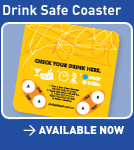|
The Sunday Times
By Fiona Adolf, December 01 2002
Alarm call on drink spiking
DRINK-spiking in Perth bars and nightclubs has reached
alarming levels, according to a top Perth doctor.
It is believed there could be as many as 15 spiking
incidents each week – five or six times the number
reported to police.
Most occur in Perth nightclubs.
The figures come from a recent assessment of calls
from victims to a range of helplines.
Paul Quigley, an expert in emergency medicine and toxicology,
said figures compiled since a police crackdown last
month showed drink-spiking was much more common than
previously believed.
A study revealed that for every case of suspected drink-spiking
reported to police there were five or six reports to
helplines such as the Poisons Information Centre, Health
Direct and the Alcohol and Drug Information Service.
Dr Quigley said he believed the true extent of the
problem had been hidden because many people did not
know which service to phone or did not want the police
involved.
Police said last month there had been 135 cases of
drink-spiking in WA this year, compared with 66 last
year. But Dr Quigley, a registrar at Sir Charles Gairdner
Hospital, said the true figure was likely to be five
or six times that.
Police, health authorities and the hospitality industry
united to combat the problem with the drink-spiking
awareness campaign launched on November 14.
The drugs most commonly used in WA drink-spiking are
alcohol and a variety of benzodiazepines. Symptoms include
nausea, dizziness, loss of co-ordination, a lowering
of inhibitions and unconsciousness.
"The most important thing to do if you think your
drink has been spiked is to seek help while you are
still drugged or at least within 12 hours," Dr
Quigley said.
Sergeant Steve Guest, from the police alcohol and drug
co-ordination unit, said the figures were a concern,
though in some cases people mistakenly believed their
drinks were spiked when they simply had had too much
to drink.
He said there were three kinds of spikers, known by
police as the "three Ps": Pranksters spiked
drinks just for a laugh; Practisers were learning how
much of a particular drug was needed for the desired
effect; and Perpetrators knew exactly what they were
doing.
Sgt Guest said it was a myth that only women were targeted.
He had heard of a recent case in Victoria in which young
men unwittingly starred in pornographic videos and photographs
after having their drinks spiked.
There had also been nine cases in Perth in recent years
in which middle-aged men were robbed by younger women
after having their drinks spiked.
|

